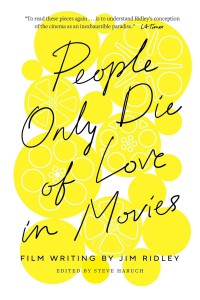People Only Die of Love in Movies
Film Writing by Jim Ridley
Edited by Jim Ridley and Steve Haruch


Average rating: ![]()
| 0 | rating | |
| 0 | rating | |
| 0 | rating | |
| 0 | rating |
Your rating: -
Book Presentation:
Popular Culture Association Ray and Pat Browne Award for the Best Reference/Primary Source Work in Popular and American Culture, First Runner-Up, 2019
Combining a cineaste's encyclopedic knowledge of film with a child's sense of wonder, Jim Ridley wrote about movies in a way few others can.
He reveled in the joy and mischief of cinema, dwelled on its beauty and violence, and navigated the full breadth of its mythology with clarity and enduring curiosity that earned him the respect of critics around the country. At the time of his unexpected death in 2016, Ridley was editor-in-chief of the alt-weekly Nashville Scene, the paper where his incisive, wide-ranging film reviews won him a devoted readership beginning in 1989.
People Only Die of Love in Movies takes its title from a line in the 1964 movie musical The Umbrellas of Cherbourg, the subject of one of Ridley's best-known pieces, included in this volume. In all, the anthology collects nearly one hundred of Ridley's film reviews, essays, and journalistic works, expertly organized by editor Steve Haruch into writing by film genre (e.g., Westerns, the Nouvelle Vague), cinematic theme (e.g., heroes, sexuality), and writing style (e.g., negative reviews, narrative journalism) to demonstrate Ridley's range.
People Only Die of Love in Movies invites its readers to revisit favorite films, discover new loves, and immerse themselves in the unparalleled writing of a discerning and knowledgeable critic.
About the authors:
Jim Ridley was a writer and editor at the Nashville Scene for more than twenty-five years, its resident film critic, and most recently the paper's top editor. Under his editorship, the Scene won forty awards from the Association of Alternative Newsmedia, averaging better than five per year. Ridley took home first place in arts criticism twice himself. He also contributed to other publications such as the Village Voice, the Criterion Collection, and Cinema Scope. As a champion of arts cinema, Ridley's advocacy helped save the Belcourt Theatre in Nashville from closure in the early years of the new millennium.Steve Haruch is a writer, editor, and filmmaker based in Nashville. His work has appeared in the Nashville Scene, the New York Times, NPR's Code Switch, the Guardian, and elsewhere. He is currently producing a documentary film about the history of college radio.
Press Reviews:
"A moving tribute to a great American film critic, this collection brings together an exhilarating array of the best of Jim Ridley's writing, carving out clever pathways to guide readers through his far-ranging yet always very personal cinephilia—and through film history itself—and to paint a vivid picture of this beloved Nashvillian. The loss of Ridley's big-hearted and stylish voice left a giant hole in contemporary film criticism, but this book performs a great service by creating a permanent reminder of the magnitude of his writing and film-advocacy achievements. Thank you, Steve Haruch, for this labor of love."
—Liz Helfgott, Editorial Director, The Criterion Collection
"[I]mpeccably curated and edited by Steve Haruch. . . . To read these pieces again, rich in scholarship and suffused with pleasure, is to understand Ridley's conception of the cinema as an inexhaustible paradise."
--Justin Chang, Los Angeles Times
"Ridley is among those few 'reviewers' whose writing really does move into the realm of enduring film criticism. His examples are taken from the wide history of international cinema, and he makes unexpected connections between films that abide by a taste for cinema that is also, I want to say, an ethics of cinema. The organization of this volume brings Ridley's critical imagination to the fore."
—Jennifer Fay, Director of Cinema & Media Arts, Vanderbilt University
"In vibrant, often uproarious prose, the book chronicles a lifelong love affair with the cinema. Reading Ridley's reviews feels like having a jocular chat with a pal that takes an unexpectedly personal turn. . . . Expertly edited by former [Nashville] Scene staffer Steve Haruch, the book features 94 pieces, loosely grouped into 12 chapters according to genre or theme. It's an inspired approach, giving the informal sensation of Ridley riffing on his favorite topics, whether the Nouvelle Vague or Westerns. . . . [R]eading Ridley you can't help but think: here's a guy who really loved his job."
--Sean Burns, RogerEbert.com
"I've been reading a collection of [Jim Ridley's] pieces put together by . . . Steve Haruch called People Only Die of Love in Movies. It will be published in June and you should get it. It's really good."
--David Edelstein, New York magazine
"[T]here's such a wide range of films covered in People Only Die of Love in Movies, and so much unique insight into why they matter, that the book doubles as a sweeping cinematic history lesson and an introduction to an immensely likable human being. . . . [T]he writing's so vibrant and detailed that it invites readers into [Ridley's] head, where different cultures--high and low, and from around the globe--coexisted agreeably."
--Noel Murray, Village Voice
See the publisher website: Vanderbilt University Press
> On a related topic:
Robots That Love (2025)
Artificial Amours in Myth, Folklore, Literature, Popular Culture and the Real World
Subject: Genre > Science Fiction
Understanding Love (2014)
Philosophy, Film, and Fiction
Dir. Susan Wolf and Christopher Grau
Subject: Genre > Romantic films
Conjugations (2012)
Marriage and Form in New Bollywood Cinema
The Drive-In (2025)
Outdoor Cinema in 1950s America and the Popular Imagination
by Guy Barefoot
Subject: Sociology
Audience Sociology and Consumer Behavior in the Film Industry (2025)
Dir. Azime Cantaş
Subject: Sociology